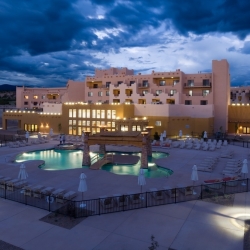The U.S. Justice Department began proceedings to seize $10.1 million in gambling revenues from the Pojoaque Pueblo tribe, which owns casinos in New Mexico. A spokeswoman for the US Attorney for New Mexico, John C. Anderson, claimed the money is “proceeds of illegal gambling”.
The $10.1 million has been held in an escrow account for the past 2+ years. The cash has built up as a dispute between the State of New Mexico and the Pojoaque Pueblo tribe has continued.
In 2015, the gaming compact between New Mexico and the Pojoaque Pueblo ended. Negotiations between the administration of Gov. Susana Martinez (R) and Pojoaque Pueblo Gov. Joseph M. Talachy began at the time, but broke down.
The two sides began a yearslong court battle over the new gaming compact. The Pojoaque Pueblo tribe argued negotiators for Gov. Martinez did not bargain in good faith. Susana Martinez argues that the tribe refuses to pay a higher tax rate, which she says are legal.
Indian Gaming Regulatory Act
A cursory look at the 1988 Indian Gaming Regulatory Act suggests the Pojoaque Pueblo are correct. The law states that tribes like the Pojoaque Pueblo have the right to open casinos on their reservations, but must come to a compact with the state in which they reside.
So far, that would indicate the tribe is breaking a federal law, but the IGR Act mandates that a state like New Mexico can only impose enough taxes to pay for their regulation and oversight of tribal gaming. If a state wants to impose a higher tax rate, it must give concessions to the tribal casino.
Gaming Compact’s Tax Rates
Gov. Martinez’s adminstration is thus trying to impose taxes over the federally mandated rate, but is refusing to give anything in return. A concession is something like a monopoly over certain kinds of gaming or a promise not to license casinos within a certain radius of the tribal casinos. Pojoaque Pueblo Gov. Joseph M. Talachy says the State of New Mexico never offered such concessions — and a 3-year record of the negotiations suggests he’s right.
In 2015, the U.S. Attorney for New Mexico agreed with the Pojoaque Pueblo tribe. So did the US Department of the Interior’s Indian Affairs Bureau, which approves Native American gaming in the United States. Months later, a US federal judge agreed with the Pojoacque Pueblo tribe, though several judges have ruled on the disputes and have ruled for differing sides in the case.
In August 2017, the tribe eventually agreed to sign a gaming compact with New Mexico, but never turned over the money it put in escrow during the longstanding dispute. New Mexico claims the money belongs to it, while the tribe says the gaming compact stated it did not have to turn over the money.
New Federal Administration, New Attitude
The decision to sign a new compact seemed to be a calculation based on new federal oversight. Ryan Zinke is now Secretary of the US Interior Department, while US Attorney General Jeff Sessions heads the US Justice Department.
The US Attorney for New Mexico, John C. Anderson, who was chosen by President Donald Trump, took office in February 2018.
The new adminstration officials appear to have the reverse view in the dispute between Gov. Susana Martinez and the Pojoaque Pueblo tribe. A spokeswoman for John Anderson, who was a Sante Fe attorney before his selection, said on Friday, “The United States has now initiated a civil forfeiture process to address the impasse that has arisen between the state and the pueblo.”
New Mexico’s Stance: “Tax Holiday”
State officials have argued throughout the stalement that allowing the tribe to put the money in escrow is giving them a “tax holiday”. The impasse put the leverage on the side of the Pojoaque Pueblo, because they held the money.
The civil forfeiture which began on Friday should put the leverage on the side of the State of New Mexico. Whether the tribe can negotiate a return of the funds with a new state government administration is now the question at hand.
Pojoaque Pueblo Tribe’s Response
The tribe did not tip its hand in its press release on Friday’s move by the Justice Department. Joseph M. Talachy released a statement on Friday which read: “I am disappointed that the Department of Justice has chosen to pursue this course of action.”
“The money in this account by law should help provide food, shelter, education and other basic necessities for the Pueblo’s people, including funds to fight the overwhelming opioid epidemic that is devastating the Pueblo.”
2018 New Mexico Governor’s Race
The Pojoaque Pueblo tribe’s hope now would seem to be a more amenable administration in 2019. Susana Martinez is prohibited by term limits from running for a 3rd consecutive term as New Mexico governor, so the state will elect a new governor in November 2018. U.S. Representative Steve Pearce (2nd District) is the lone nominee for the Republican Party, while U.S. Representative Michelle Lujan Grisham (1st District) is the odds-on favorite in a 5-way race to win the Democrat Party nomination.
The Cook Political Report, Rothenberg Political Report, and Sabato’s Crystal Ball all rate the gubernatorial race as “Lean Democrat”. The Tarrange Group gave Michelle Lujan Grisham a 47%-43% lead in a race against Steve Pearce, with 10% undecided and a margin of error of +/-4.1%. Susana Martinez won with 53% of the vote in 2010 and 57% of the vote in 2014, so recent history gives the GOP an edge in a gubernatorial election. Hillary Clinton defeated Donald Trump 48% to 40% in the 2016 election, though.

